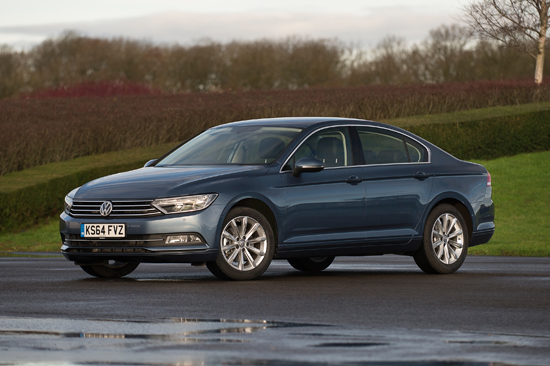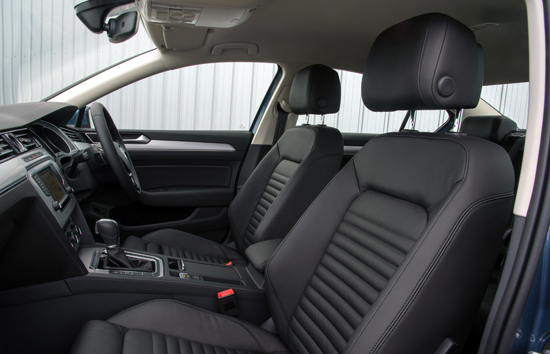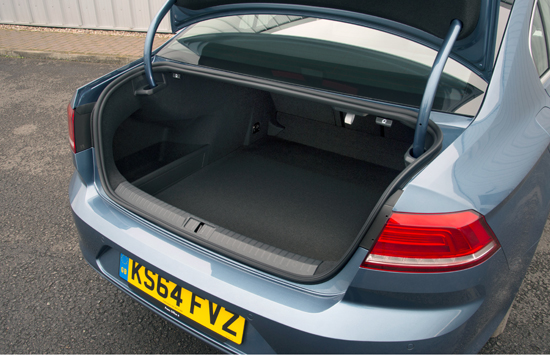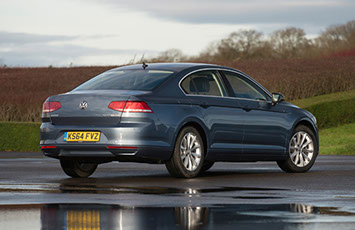VW’s latest Passat is actually the eighth generation since
they introduced the name in 1973. By Tom Scanlan
It’s a completely new car and, as pretty well all manufacturers are managing at the moment, offers more efficiency in terms of fuel consumption and up to 14% cleaner emissions. Some of this is down to a weight saving of up to a massive 85 kilograms.
Of course, no new car would be launched without other customer-attracting goodies.
First of all, when you get into the new Passat, you notice plenty of space; although the car is overall very slightly shorter than the outgoing model, the wheelbase is about eight centimetres longer; the car is also a bit lower and a bit wider. All this leads to improved leg and head-room (the lower seats adding to this) and better luggage capacity.
The Passat is launched only with diesel engines. These range from a 1.6-litre 120 PS to three 2-litre versions: 150PS (likely to be the best-seller), 190PS and the range-topping 240PS bi-turbo. If you can wait until June for your new Passat, then there will also be the choice of a Blue Motion 1.4-litre diesel that emits only 95 g/km and so will cost nothing in annual road fund licensing.
July sees the arrival of an Alltrack version of the estate Passat, while a plug-in hybrid comes our way in October.
From the safety point-of-view, standard highlights include a Post-Collision Braking System and, for SE spec cars and above, VW’s Front Assist, Adaptive Cruise Control and Pre-Crash systems.
Among the myriad options that will be on offer later this year, possibly the most notable — and certainly the most noticeable to the driver -– is the virtual instrument panel (as owners of some of the newest Audis will already be familiar with); this can be configured in various ways, with, for example, the speedo and rev-counter able to be reduced in size if you need to have more satellite navigation display to look at… not forgetting the head-up display enabling the driver’s attention not needing to be averted from the road so much.
Another feature making the driver’s life easy includes the further-developed Park Assist that includes the option for the car to park itself forwards into, say, a space at a supermarket where access to load up the boot after shopping is important. Traffic Jam Assist makes stop-and-go driving more comfortable.
VW also have a world first with its Trailer-Assist system; this helps when a spot of tricky reversing with a trailer is required, without any modifications to the trailer itself being needed.
How many of us will admit to re-fuelling a diesel car with petrol, or vice-versa? I will, for a start…so, if only I’d had VW’s mis-fuelling prevention system!
But what are the new cars like to drive and travel in?
We tried two versions, both of which, with options, came out at more than £30,000: first was a 1.6-litre 120PS Diesel saloon with SE Business specification including the DSG auto gear box, near the top of the range.
Second came the lively 2.0-litre estate also in Business trim, but with a six-speed manual gear change.
Suffice to say that both performed faultlessly. The 1.6 seemed a bit noisier under load than did the bigger-engined car, but both were commendably quiet and smooth. The auto box was excellent and the manual as good as any of its type. The brakes were excellent and our emergency stops, one just for practice and another to avoid mowing down a pheasant, were immaculate. The steering was precise and the handling was safe and without roll and the ride was very comfortable. All of these are now ‘givens’ in most cars from all the manufacturers, but of course still worth noting.
Fuel consumptions on identical fairly undemanding cross-country trips were remarkably similar with the 1.6 auto at 47.0 mpg and the 2.0-litre at 48.5 mpg as indicated by the trip computers.
Rear seat passengers have good leg-room and the boots in both cars were flat and capacious; it’s worth learning how to use the removable floor so that, once understood, it won’t cause any head-scratching. The same goes for the cover in the estate car – and how to stow away said cover, if required.
VW’s world-first Trailer Assist optional feature is a must for anyone likely to tow a trailer or, indeed, a caravan. It’s all done by mirrors! Drive past the place where the trailer or caravan is going to go, select the Assist mode on the dashboard, use the usual adjuster control to set the rearview in a straight back position – a dashboard display indicates this — and, without touching the steering wheel, let the car reverse (at no more than three miles an hour) towards the space you want; then stop and re-set the mirror fully to the right (or left) and drive in. Job done, very clever indeed.
The test cars appeared to be as well-built as is expected of Volkswagen and were smart and well-thought-out ergonomically.
Prices start at £22,215 for saloons and there’s a premium of £1,530 for estates.
WHEELS-ALIVE TECH. SPEC. IN BRIEF
VW Passat 2.0 TDI 150PS 6-speed Manual (as example)
Drivetrain: Front engine, front wheel drive
Engine: 1968 cc twin cam, 4-cylinder in line, turbo direct injection
Power: 150PS @ 3500-4000 rpm
Torque: 340 Nm (251 lb/ft) @ 1750-3000 rpm
0–62 mph: 8.9 seconds
Top speed: 135 mph
Fuel consumption, ‘official’ figures:
‘Urban’: 58.9 mpg
‘Extra urban’: 76.3 mpg
‘Combined’: 68.9 mpg
Actual figure displayed during our road test: 48.5 mpg
CO2 emissions: 107g/km
PRICE (‘On The Road’): £26,040 before options
Warranty: Three years/60,000 miles
Insurance group: 19E



